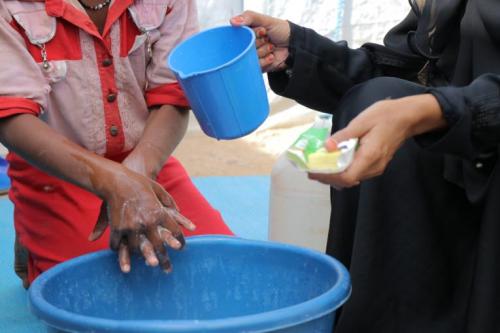Over 5 million children face threat of cholera and acute water diarrhea in the midst of COVID-19 as Yemen gets heavy rains
Over 5 million children under the age of five in Yemen are facing a heightened threat of cholera and Acute Watery Diarrhoea (AWD) as the country continues to experience increased heavy rains since mid-April. More than 110,000 cases of suspected cholera have been recorded across 290 of Yemen’s 331 districts since January 2020. Children under the age of five account for a quarter of these cases.

At a centre for families fleeing insecuirty, Esslam learns how to correctly handwash. She is being taught by Zahara a mother to mother peer educator, trained to spread health information and awareness.
This comes as Yemen grapples with the impact of the global COVID-19 pandemic. Thus far only one case has been reported in the country, but the risk of outbreak remains very high.
“Children in Yemen continue to face a myriad of threats to their survival. A further spread of cholera, high levels of malnutrition and outbreaks of vaccine-preventable diseases compounded by COVID-19 will only exacerbate the burden that children and their families already face,” said Sara Beysolow Nyanti, UNICEF Representative in Yemen. “A tragedy continues to unfold in Yemen in the full glare of the world,” she added.
Recent heavy rains and flash floods in Aden, Abyan, Lahj and Sana’a City have interrupted access to safe drinking water and sanitation facilities and destroyed homes and displaced families providing, a perfect recipe for the spread of cholera.
UNICEF has responded urgently to families affected by the floods by providing basic hygiene kits, including disinfectants, chlorine, buckets and towels. The response also focuses on the repair of the disrupted water infrastructure to restore immediate access to safe drinking water for children and their families.
Very low levels of sanitation services especially in urban areas, use of contaminated water, lack of awareness about basic hygiene practices, including effective handwashing and food hygiene drive the spread of cholera/Acute Watery Diarrhoea in Yemen where basic services are on a brink of collapse or in best cases are inadequately maintained due to the conflict and years of poverty and neglect.
“Cholera and acute watery diarrhoea are preventable and can be treated. Our response, therefore, focuses on making sure families and their communities have sustained access to clean water and improved sanitation, while also being aware of how they can reduce the health risks,” said Nyanti.
In 2017, UNICEF and partners like the World Health Organization (WHO) managed to contain one of the world’s worst cholera outbreaks through a combination of community awareness; Water, Hygiene and Sanitation(WASH); and Health response, including strengthening of surveillance and case detection, deploying rapid response teams to several affected areas and scaling up treatment of cholera and Acute Watery Diarrhoea, measures that will continue this year to alleviate the suffering of children and families.
“Without an end to the brutal five-year-old long conflict in Yemen, these devastating preventable disease outbreaks will continue to stalk the lives of many, and first and foremost vulnerable children,” said Nyanti.
Source:UNICEF
- 219 reads
Human Rights
Ringing FOWPAL’s Peace Bell for the World:Nobel Peace Prize Laureates’ Visions and Actions

Protecting the World’s Cultural Diversity for a Sustainable Future

The Peace Bell Resonates at the 27th Eurasian Economic Summit

Declaration of World Day of the Power of Hope Endorsed by People in 158 Nations

Puppet Show I International Friendship Day 2020

